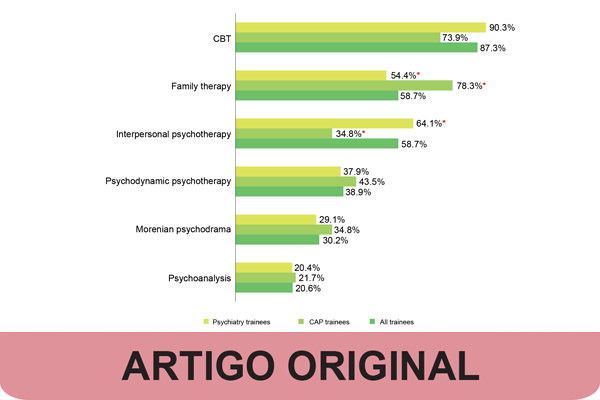SOCIAL MEDIA
Portuguese Medical Association's Scientific Journal

Introduction: Psychotherapy is an effective treatment for various mental disorders. Most recommendations advocate training in psychotherapy for psychiatry and child and adolescent psychiatry residents. However, incorporating psychotherapy training into the curricula of psychiatric residency programs has proven difficult. In Portugal, competence in psychotherapy is not mandatory to become a psychiatrist or a child and adolescent psychiatrist. Our study aims to describe the perspectives of psychiatry and child and adolescent psychiatry residents on psychotherapy training in Portugal.
Methods: The authors developed a voluntary, anonymous, online self-reported questionnaire to be applied to psychiatry and child and adolescent psychiatry residents. Data was collected during 2023.
Results: The response rate was 29.9%. The main results were that most Portuguese psychiatry and child and adolescent psychiatry trainees stated that their institution did not provide psychotherapy training (95.2%) and were dissatisfied with the psychotherapy training provided by their residency centers (96.8%). All residents agreed that psychotherapy training involves a significant financial investment, and almost all (96.8%) believed it involved a substantial investment in terms of time in the long term. Likewise, most trainees (94.4%) considered psychotherapy training should be included within the residency work schedule. Crucially, psychiatry and child and adolescent psychiatry residents were interested in psychotherapy training (93.6%), and most regarded psychotherapy as a mandatory competence of the residency training program (85.7%). More than two-thirds (70.6%) of residents considered initiating or continuing psychotherapy training after residency. Regarding the modalities that should be included in the residency program, residents pointed out cognitive-behavioral therapy, family therapy, interpersonal psychotherapy, psychodynamic psychotherapy, and support psychotherapy. About 40% of respondents mentioned they were in personal psychotherapy during the residency.
Conclusion: Modifications in residency curricula should seriously be considered so that future psychiatrists can be qualified to provide effective psychotherapy treatment. The authors believe they provided relevant data pooled from future psychiatrists and child and adolescent psychiatrists which can be useful to help define training in a perceived essential competence.